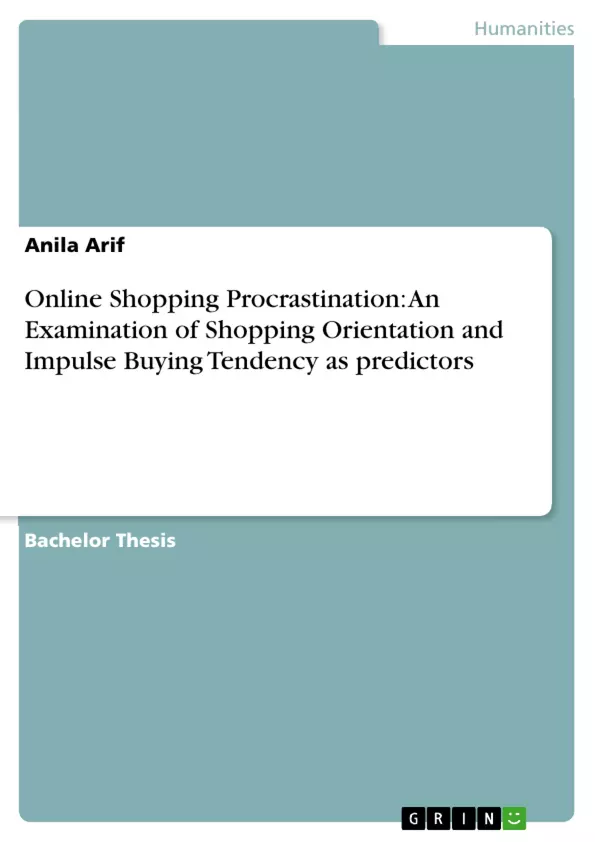The aim of this study was to identify possible predictors for the phenomenon of online shopping procrastination. While there exist several findings on the topic of online procrastination, also referred to as cyber-loafing, the research on procrastinatory online shopping is still very scarce. Hence, the foremost goal was to examine why this behaviour even occurs. Building upon literature that suggests links between procrastination and impulsivity as a personality trait, one predictor that was looked at was impulse buying tendency. The other factor to possibly predict online shopping procrastination was chronic shopping orientation, assuming that hedonic shopping orientation would positively predict it, as past studies imply that procrastination is a behaviour that occurs to avoid task aversiveness, therefore choosing to engage in a more pleasant and enjoyable activity. The study was conducted through an online questionnaire, including four various scales, that was open for all sociodemographic groups. However, the majority of participants were female as well as students and the mean age was 25.32. Results confirmed the above-mentioned traits as predictors for online shopping procrastination, showing a strong positive effect for impulse buying tendency, a medium positive effect for hedonic shopping orientation and a medium negative effect for utilitarian shopping orientation as assumed. This means that people with higher impulse buying tendencies as well as those with a hedonic shopping orientation would engage in online shopping procrastination more.
Inhaltsverzeichnis (Table of Contents)
- Abstract
- Introduction
- Theoretical Background
- Online Procrastination
- Online Shopping
- Impulse Buying Behaviour
- Online Shopping Procrastination
- Summary of Research and Formation of Hypotheses
- Methods
- Choice of Method
- Study Design
- Measures
- Recruitment of Participants and Sample Description
- Results
- Descriptive Statistics
- Results Regarding Hypotheses
- Explorative Results
- Discussion
- Summary
- Interpretation and Discussion of Results
- Implications
- Limitations and Future Research Lines
- Conclusion
- References
- Appendix
Zielsetzung und Themenschwerpunkte (Objectives and Key Themes)
The main goal of this study is to identify potential predictors for the phenomenon of online shopping procrastination. The research focuses on understanding why this behavior occurs, particularly in the context of online shopping, which has become increasingly prevalent.
- Examining the relationship between online shopping procrastination and impulsivity as a personality trait.
- Investigating the influence of shopping orientation, particularly hedonic shopping orientation, on online shopping procrastination.
- Analyzing the role of task aversiveness and the avoidance of unpleasant tasks in online shopping procrastination.
- Exploring the influence of procrastination and impulsivity in different behavioral domains, particularly in relation to online activities.
- Understanding the factors that contribute to online procrastination in general, including social media use, and its potential impact on online shopping behavior.
Zusammenfassung der Kapitel (Chapter Summaries)
- Abstract: This chapter provides an overview of the study's objectives, research questions, and key findings, highlighting the importance of understanding online shopping procrastination and its potential predictors.
- Introduction: This chapter defines procrastination and explores existing research on procrastination, particularly its link to impulsivity and task aversiveness. The chapter also introduces online procrastination as a specific area of interest and its relevance in the context of growing online shopping trends.
- Theoretical Background: This chapter delves into the theoretical framework underpinning the study, outlining key concepts such as online procrastination, online shopping, impulse buying behavior, and the relationship between these concepts and online shopping procrastination. It also discusses previous research findings and formulates specific hypotheses for the study.
- Methods: This chapter describes the methodology used in the study, including the choice of method, study design, measurement instruments, and participant recruitment process.
- Results: This chapter presents the findings of the study, including descriptive statistics, results related to the hypotheses, and exploratory results.
- Discussion: This chapter interprets and discusses the study's results, highlighting the implications of the findings and discussing potential limitations of the study. It also suggests future research directions to further investigate the phenomenon of online shopping procrastination.
Schlüsselwörter (Keywords)
This study explores online shopping procrastination, focusing on the predictive power of impulsivity and shopping orientation. It examines the role of task aversiveness and its potential impact on online shopping behavior. Key terms include online procrastination, cyber-loafing, impulse buying, hedonic shopping orientation, utilitarian shopping orientation, and online consumer behavior.
- Citation du texte
- Anila Arif (Auteur), 2021, Online Shopping Procrastination: An Examination of Shopping Orientation and Impulse Buying Tendency as predictors, Munich, GRIN Verlag, https://www.grin.com/document/1240164



